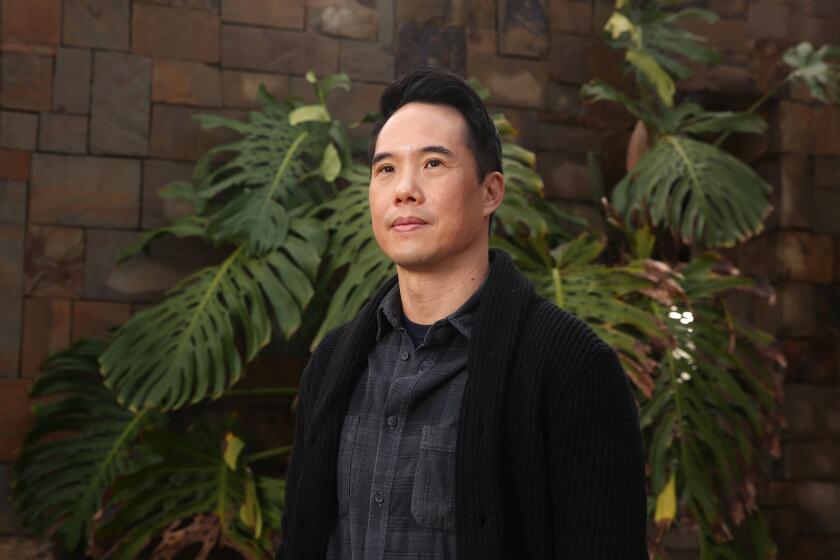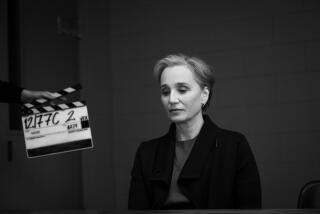How do you adapt an 800-page novel for TV? 7 years, 300 drafts and plenty of crying
“The Luminaries” seemed to have everything Hollywood wants in a book.
A commercial and critical hit when it was published in 2013, Eleanor Catton’s immersive novel was set on the rugged southwest coast of New Zealand during its 1860s gold rush. A tale of fate and fortune on the antipodean frontier, it had all the makings of a great screen adventure: rowdy saloons and smoke-filled opium dens, devious blackmail schemes and treacherous ocean voyages, ruthless villains and star-crossed lovers.
“The Luminaries” also boasted undeniable cachet, winning the 2013 Booker Prize over titles by more established names like Colm Tóibín and Jhumpa Lahiri and making Catton, then 28, the youngest winner in the history of the prestigious award.
But as enticing as it might have been in the abstract, it also presented obvious technical challenges: the book clocked in at a heaving 800 pages, followed a Dickensian assortment of nearly 20 main characters, and used an elaborate narrative format inspired by the signs of the zodiac.
“The joke between us,” says director and executive producer Claire McCarthy, “was that ‘The Luminaries’ was impossible to make.”
Not quite.
Over the past 20 years, industry shifts have funneled more novelists into TV rooms than ever. It’s salutary in many ways — beginning with health insurance.
On Sunday, a six-episode TV adaptation co-produced by the BBC makes its debut on Starz, and in an unusual if not entirely unheard-of arrangement, Catton wrote the limited series herself.
The pared-down story centers on three characters: Anna Wetherell (Eve Hewson), a mysterious and illiterate young woman who travels to New Zealand in search of a new life; Emery Staines (Himesh Patel), a kind adventurer who forms a powerful connection with Anna as they arrive ashore; and Lydia Wells (Eva Green), a fortune teller and madam who foils Anna’s plan to reunite with Emery and swindles her into sex work.
The book’s seven-year journey to the screen began even before it was published. Executive producer Andrew Woodhead read an advance copy and immediately saw the potential for a television series in the “rich and vivid world” it portrayed, he says, and in its core emotional mystery: “What drives a human being to risk their life on a six-month sea voyage to the other side of the world in the hope of making their fortune on a gold field?”
Woodhead optioned “The Luminaries” before it landed the Booker Prize, which helped the project generate more interest from the industry. But he could not get a screenwriter to commit to adapting it. “They would very sensibly turn it down,” recalls Catton, who would often send the writers “these slightly mad emails” where she’d make suggestions about how to tackle the book.
“Somewhere along the line, Andrew just turned to me and said, ‘You seem quite interested in this. Why don’t you have a go at writing it yourself?’” (In fittingly “Rashomon”-esque fashion, Woodhead recalls it somewhat differently, saying that on a trip to New Zealand Catton told him she’d like to do it.)
Catton taught herself screenwriting “the nerdy way,” she says — by consulting books, including John Yorke’s guide to dramatic writing, “Into the Woods: A Five-Act Journey Into Story.” She also revisited early seasons of “The Sopranos” and read the corresponding scripts. “And then the Robert McKee school is all about rewatching ‘Chinatown,’” so she did that too.
Catton estimates she wrote as many as 300 drafts of the pilot episode because, she says, “any story has infinite possibility to adaptation, so I felt like I had to try multiple approaches.”
Who keeps the adaptation pipeline churning? These 8 agents, managers, scouts and producers are among Hollywood’s top conduits from book to screen.
Along the way, she realized that her book, though often described as “cinematic” because of its sweeping scale and sprawling cast of characters, was anything but. “I almost feel like I had it backwards. What makes film and television so powerful and irresistible is getting so inside the desire of a character that their desires become your desires. I hadn’t really realized how much desire is the language of the medium, whether it’s the desire for information, for certain people to get together or the villains to be vanquished,” she says. “I had to learn for the first time what the essence of drama is.”
In late 2015, the BBC declined to greenlight the series after reading an early draft of Episode 1, but what might have been a major setback turned into a breakthrough: Overnight, Catton drew up a new outline of the series that shifted the focus to Anna. Within a few months, she’d written a completely new version of the script. With U.K.-based production company Fremantle on board as co-producers and additional financiers, the BBC gave the series the go-ahead in mid-2016, commissioning six episodes. (Good news, though Catton says she’d been “hoping for seven because of course there are seven planets in astrology.”)
This overhaul required reimagining Anna, a deeply passive personality in the book, and simplifying a circular narrative that imagined each character as “a component part in a kind of living horoscope,” Catton says. “As I learned, it’s very difficult to like a passive character onscreen.”
Unlike the book, which barely features any significant female characters in its first few hundred pages, the series immediately establishes Anna as the chief protagonist. It opens with Anna, pursued at night by men on horseback for reasons unknown, collapsing outside a cabin deep in the wilderness. The story flashes back to trace her journey to this perilous situation — including her seemingly predestined meeting with Emery aboard ship and an unlucky run-in with Lydia that steers her toward ruin.
“When we started thinking about what’s distinctive in this story, rarely had we seen stories about women deeply in a world of men,” says executive producer Christian Vesper, president of global drama at Fremantle.
16 projects originating as books are already in the awards race, from “Emma” to “Bridgerton.” Were they worth the trouble? Our critics chime in.
Catton was determined not to be too precious about making cuts or changes to her own material, boiling down her great doorstopper of a novel to about 300 screenplay pages. She says she was more cautious when adapting Jane Austen’s “Emma” for a film released last year: “I had a kind of instinctive reverence for it that I didn’t have with my own work at all.”
“There is no doubt in my mind only Eleanor could have written these scripts,” McCarthy says. “She was more than happy, in many ways, to subvert her original work. Sometimes, to be honest, more than I would have liked. My job was to steer this towards a playable, dramatic and emotional framework and to really try and bring this to the screen without departing too much from the novel, with a sense of cohesion and emotional logic.”
McCarthy, whose credits include the 2018 film “Ophelia,” was determined to preserve some of the book’s astrological themes. Working with key department heads, including cinematographer Denson Baker, she mapped out which phase the moon was in for every scene in the series and used strategic lighting, framing, costumes and sets to nod to the book’s cosmic elements.
Filming a sweeping period piece on a relatively tight BBC budget, even with additional financial support from Fremantle, was another challenge. There is little architecture from the mid-1800s remaining on the south island of New Zealand. Much of the drama in the series revolves around a valuable ship, but the production had no access to a heritage marine fleet. Woodhead recalls one sleepless night about four months before production “where I thought I would have to ring the BBC and call it all off.”
Filming began in early 2019, and even the shooting scripts of the series went through many changes thanks to the vagaries of TV production. “It was just devastating,” Catton says. “Sometimes the producers would come over to my chair and just say, ‘Sorry, we can’t afford this.’ And I’d be in tears.
“I feel kind of ambivalent about some of the choices we ended up making in the show,” she continues. “It’s such a different experience to writing a novel, where you have a total sense of ownership over everything, for better or for worse. So if a novel falls down, then that’s your fault. And the successes of the novel are yours as well because you’re the sole author of it.” (One adjustment she’s definitely not ambivalent about: Emery, whose race is not specified in the book, is played by Patel, a British actor of Indian descent.)
After winning the Booker Prize, Catton says she felt alone and unsure of herself as she traveled to speak at literary festivals around the world. She was drawn to television because she longed for something more collaborative. The catch, as she discovered, is that you have to make many compromises along the way, especially with a project as ambitious as “The Luminaries.”
For Catton, who has spent more time adapting her novel than she did writing it in the first place, the experience has been an eye-opener about the complexity of the producer’s job. “It’s made me much more forgiving,” she says. “When I watch watch television and film now, I’ll be with my husband and we’ll think, ‘Oh, that seemed a bit weird. Maybe they ran out of time.’”
Catton likes to think about the collective effort of television using a statistic her father compiled, adding up all the people who worked on the series and how many months they toiled away. “He figured out that if a single person had been working on ‘The Luminaries’ at the time when Shakespeare was born, they would just be finished with it now.”
‘The Luminaries’
Where: Starz
When: 9:30 p.m. Sundays
More to Read
The complete guide to home viewing
Get Screen Gab for everything about the TV shows and streaming movies everyone’s talking about.
You may occasionally receive promotional content from the Los Angeles Times.








